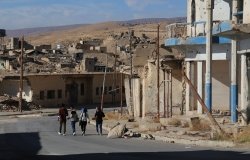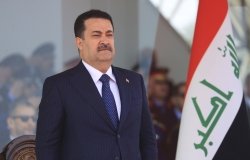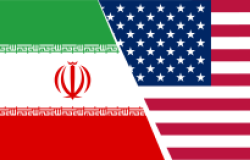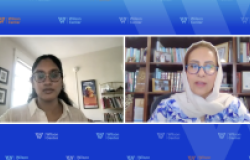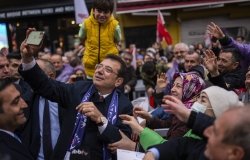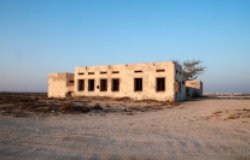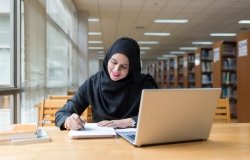Woodrow Wilson Center's Visiting Arab Journalist Program: 2012
The Middle East Program at the Woodrow Wilson International Center for Scholars is pleased to announce the 2012 competition for the Wilson Center's Visiting Arab Journalist Program. One Arab, Middle Eastern or North African journalist will be selected each year. Successful applicants will spend 3 months in residence at the Woodrow Wilson Center, in the heart of Washington, D.C., where they will carry out advanced, policy-oriented research and writing. This program is made possible by generous financial support provided by Dr. David Ottaway, a Senior Scholar at the Woodrow Wilson Center.
How to Apply
The Woodrow Wilson International Center for Scholars and the Middle East Program are pleased to announce the 2012 competition for the Woodrow Wilson Center's Visiting Arab Journalist Program. One journalist from the Middle East/North Africa region will be selected each year for the duration of the grant. Successful applicants will spend three months in residence at the Woodrow Wilson Center, in the heart of Washington, D.C., where they will carry out their own policy-oriented research and writing.
The Wilson Center
The Woodrow Wilson International Center for Scholars is Washington's only independent, broad spectrum, non-partisan institute for advanced research where vital current issues and their historical and cultural backgrounds are explored through research and dialogue. Created by the Congress of the United States as the nation's official memorial to its twenty-eighth president, the Center seeks to commemorate through its residential research programs both the scholarly depth and the public policy concerns of Woodrow Wilson.
Eligibility
This competition is open to Arab men and women from, and working in, the Middle East or North Africa in the Arabic media. Applications will be accepted from members of the print, television, radio or electronic media. Candidates must be currently working as reporters and columnists or broadcasters.
Applicants must have at least five years of professional experience and must be able to work in both written and spoken English and Arabic. Applicants must be able to hold a valid passport and obtain a J1 visa.
The Center will assist in the visa process.
Length of Appointment and Responsibilities
Journalists will be in residence for three months at the Woodrow Wilson Center during the U.S. academic year, with the recipient being in residence sometime between September 2012 and May 2013. While at the Wilson Center, they will be expected to carry out a full schedule of independent research and writing based on the topic outlined in the research proposal submitted at the time of application. They will also be strongly encouraged to participate occasionally in conferences organized by the Center's Middle East Program, and in other ways to participate in the intellectual life of the Wilson Center and the larger community of Middle East observers in Washington.
Stipend
The stipend provided is $5,000 per month. In addition, the Wilson Center will pay roughly three-quarters of the health insurance premiums for the visiting journalist, and the journalist will pay roughly one-quarter of the cost. The journalist will be provided with suitable work space, a Windows-based computer, and where feasible, a part-time research assistant. The Wilson Center Library provides access to digital resources, its book and journal collections, and to the Library of Congress, university and special libraries in the area, and other research facilities.
Procedures and Deadline for Applications
Applications must be postmarked by July 1, 2012.
Applicants should submit the following materials in English to the address given below, and electronically to vajp@wilsoncenter.org:
1) completed Application Form. Complete the fillable PDF of the application, print it out and mail or save an send via email.
2) a 1,000 word maximum description of a proposed project that would benefit from a stay in Washington D.C.
- a detailed explanation of the research topic relevant to the Middle East and the United States;
- including the importance and originality of the project; and
- the significance of the project to contemporary Middle East/ United States policy issues;
3) a CV or resume
4) a writing sample
5) two letters of recommendation, one of which should not be from someone with whom the applicant has worked.
Recommendation letters should address the quality and significance of the research, and the capabilities and achievements of the applicant.
Application letters and letters of recommendation should be sent to the following address:
Woodrow Wilson Center Visiting Arab Journalist Program
c/o Middle East Program
Woodrow Wilson International Center for Scholars
Ronald Reagan Building and International Trade Center
One Woodrow Wilson Plaza
1300 Pennsylvania Ave., NW
Washington, DC 20004-3027
E-mail: vajp@wilsoncenter.org
Applications for the academic year beginning September 2012 must be postmarked and submitted via electronic mail by July 1, 2012.
If applications are submitted via electronic mail, they will only be considered if followed by a hardcopy delivered to the Woodrow Wilson Center.
All applications will be reviewed by an outside independent expert panel. Final selection will be made by the Woodrow Wilson International Center for Scholars.
Evaluation Criteria
The basic criteria for selection are:
1) the importance and originality of the research project,
2) the quality of the proposal in definition, organization, clarity and scope,
3) the quality of the writing sample, and
4) the professional achievements of the applicant.
*This program is made possible by the generous grant provided to the Woodrow Wilson Center's Middle East Program by Dr. David Ottaway, a Senior Scholar.
Related Program

Middle East Program
The Wilson Center’s Middle East Program serves as a crucial resource for the policymaking community and beyond, providing analyses and research that helps inform US foreign policymaking, stimulates public debate, and expands knowledge about issues in the wider Middle East and North Africa (MENA) region. Read more

